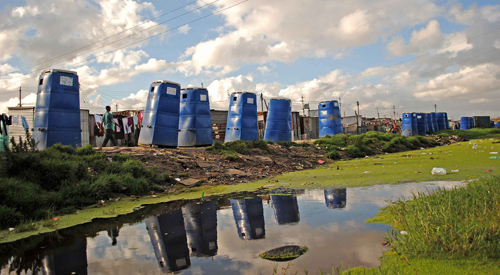Premier Zille’s childhood toilets not comparable to informal settlements
She has once more shown a lack of understanding of the lives of black people

Western Cape Premier Helen Zille defended on Twitter this past week what she said in 2014 to Khayelitsha residents on cleaning informal settlement toilets.
Zille’s defence came after eNCA’s Checkpoint exposed the daily indignities imposed on black people living in South Africa’s informal settlements. The episode was titled Sanitary Hell, and it focused on the provision of portable toilets in Johannesburg’s informal settlements.
In the episode City of Johannesburg Mayco Member Nico de Jager said that it’s the responsibility of the people using the toilets to clean them. Journalist Nkepile Mabuse asked him whether he cleans the toilet he uses in the government building, to which he replied no. Then Mabuse asked why he expects the people of Zamimpilo informal settlement in Kliptown to clean public toilets. De Jager couldn’t answer him.
I retweeted this segment of the interview saying that in 2014 Zille said the same thing about Khayelitsha informal settlement residents. Zille then replied to my tweet: “I was taught to leave a toilet (public or private) in the condition I would like to find it. Many others I know do the same thing”. She went on to say, “I have utilised almost every kind of toilet from long drop to waterless. We had bucket toilets at primary school. Same etiquette applies”.
You would think that having served as both Mayor of Cape Town and Premier of the Western Cape Zille would have greater awareness of the living conditions in informal settlements.
A few things about these toilets that Zille and De Jager expect informal settlement residents to clean. (1) They are meant to be temporary. (2) They are used over long periods of time, up to ten years in many cases. (3) These are chemical and container toilets that can be shared by more than 15 families in some communities.
Many people living in South Africa’s informal settlements still lack access to adequate sanitation services, such as functioning flush toilets. In Cape Town, we know of the infamous porta-potties, also known as portable flush toilets that are provided to informal settlement residents. This is essentially an undignified and unhygienic form of a bucket toilet. And there’s also the free-standing Mshengu toilets.
In informal settlements, using a toilet can be one of the most dangerous activities one has to perform daily. Residents often have to walk away from their homes to access them. It is particularly dangerous at night because of lack of proper lighting. Many are robbed, raped and murdered on their way to and from these toilets.
Zille’s attitude to how these toilets must be cleaned is an example of her and her followers’ white privilege. I don’t know of one white person who uses and shares a bucket toilet with hundreds of others. It is black people that experience this kind of structural violence on a daily basis because of the many failures of our government.
Exploitation of desperate black workers is also exposed in the Checkpoint episode. Sanitation contractors such as Supreme Sanitation and Sanitech are given massive tenders to provide and service chemical toilets in informal settlements. Some of the workers employed by these contractors to clean the toilets are paid a disgraceful amount of about R600 (sometimes less) per month and are not provided with protective equipment. Many in government continue to defend these companies and pay them the millions of rands of our public funds.
In the documentary an elderly man, Ebrahem Mofokeng, breaks down because of the dire conditions he and many others have lived in for decades. It is heartbreaking. The indignities and exploitation exposed in Johannesburg is no different to other municipalities. Communities and organisations such as the Social Justice Coalition (SJC) have campaigned and highlighted these issues for many years but little has changed. This is why in 2016 the SJC filed court papers in the Equality Court against the City of Cape Town for its failure to provide dignified sanitation services to poor, black and marginalised residents of informal settlements. The hearing for this case has been set for 16 and 17 October 2017.
Premier Zille’s time and focus should rather be spent on actually fixing these problems and not insulting people. Comparing her experience of having used a bucket toilet in school with that of informal settlement residents is insulting. I am not disputing that she had a hard childhood but it is incomparable to what people living in informal settlements endure; she shows a lack of understanding of how millions of black people in South Africa live.
Views expressed are not necessarily GroundUp’s.
Next: Zimbabwe Exemption Permit will not be for new applicants
Previous: Married transgender people can change their official sex, court finds
Letters
Dear Editor
Best article I've read in months. Heartfelt and straight forward, touching on exactly the serious issues we are facing in this country. Helen Zille has no interest or what so ever in the way black people live in the townships. She's a white ignorant b***ch.
The sad thing is that the same people living under these conditions will still vote for her because she continues to make promises she cannot keep. I for one have lived in the township and have experienced such conditions. And still in this day and age, 10 years later nothing has been done.
The government in general is destroying this country and what our leaders in the past have fought for. It's such a shame. I as a black person am embarrassed. White people will do nothing to help. Zille is one example.
© 2017 GroundUp. 
This article is licensed under a Creative Commons Attribution-NoDerivatives 4.0 International License.
You may republish this article, so long as you credit the authors and GroundUp, and do not change the text. Please include a link back to the original article.


